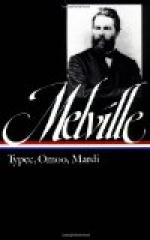“Hark to his rhapsodies! Hark, how he prates of mysteries, that not even Hivohitee can fathom.”
“Nor he, nor thou, nor I, nor any; Oro, to all, is Oro the unknown.”
“Why claim to know Oro, then, better than others?”
“I am not so vain; and I have little to substitute for what I can not receive. I but feel Oro in me, yet can not declare the thought.”
“Proud boy! thy humility is a pretense; at heart, thou deemest thyself wiser than Mardi.”
“Not near so wise. To believe is a haughty thing; my very doubts humiliate me. I weep and doubt; all Mardi may be light; and I too simple to discern.”
“He is mad,” said the chief Divino; “never before heard I such words.”
“They are thoughts,” muttered the guide.
“Poor fool!” cried Fauna.
“Lost youth!” sighed the maiden.
“He is but a child,” said the beggar. These whims will soon depart; once I was like him; but, praise be to Alma, in the hour of sickness I repented, feeble old man that I am!”
“It is because I am young and in health,” said the boy, “that I more nourish the thoughts, that are born of my youth and my health. I am fresh from my Maker, soul and body unwrinkled. On thy sick couch, old man, they took thee at advantage.”
“Turn from the blasphemer,” cried Pani. “Hence! thou evil one, to the perdition in store.”
“I will go my ways,” said the boy, “but Oro will shape the end.”
And he quitted the Morai.
After conducting the party round the sacred inclosure, assisting his way with his staff, for his child had left him, Pani seated himself on a low, mossy stone, grimly surrounded by idols; and directed the pilgrims to return to his habitation; where, ere long he would rejoin them.
The pilgrims departed, he remained in profound meditation; while, backward and forward, an invisible ploughshare turned up the long furrows on his brow.
Long he was silent; then muttered to himself, “That boy, that wild, wise boy, has stabbed me to the heart. His thoughts are my suspicions. But he is honest. Yet I harm none. Multitudes must have unspoken meditations as well as I. Do we then mutually deceive? Off masks, mankind, that I may know what warranty of fellowship with others, my own thoughts possess. Why, upon this one theme, oh Oro! must all dissemble? Our thoughts are not our own. Whate’er it be, an honest thought must have some germ of truth. But we must set, as flows the general stream; I blindly follow, where I seem to lead; the crowd of pilgrims is so great, they see not there is none to guide.—It hinges upon this: Have we angelic spirits? But in vain, in vain, oh Oro! I essay to live out of this poor, blind body, fit dwelling for my sightless soul. Death, death:—blind, am I dead? for blindness seems a consciousness of death. Will my grave be more dark, than all is now?— From dark to dark!—What




